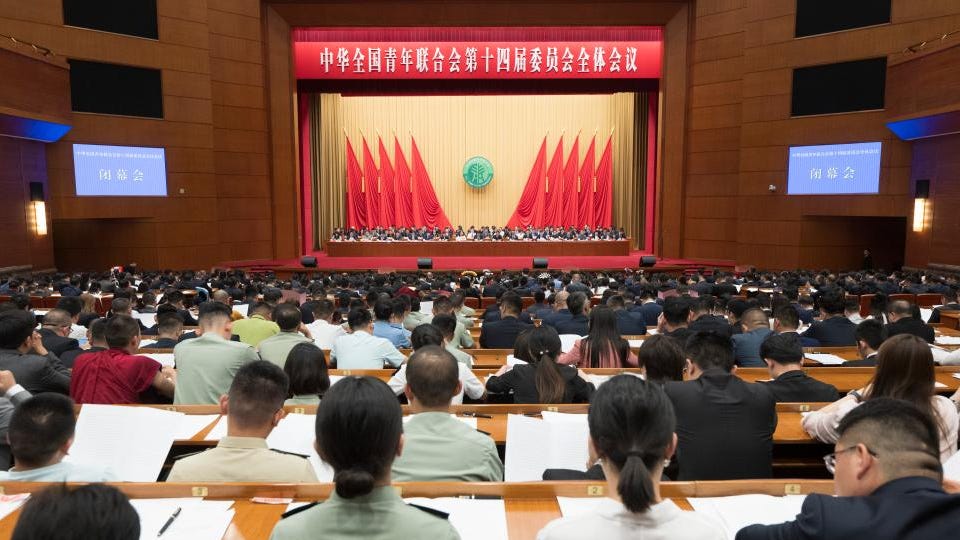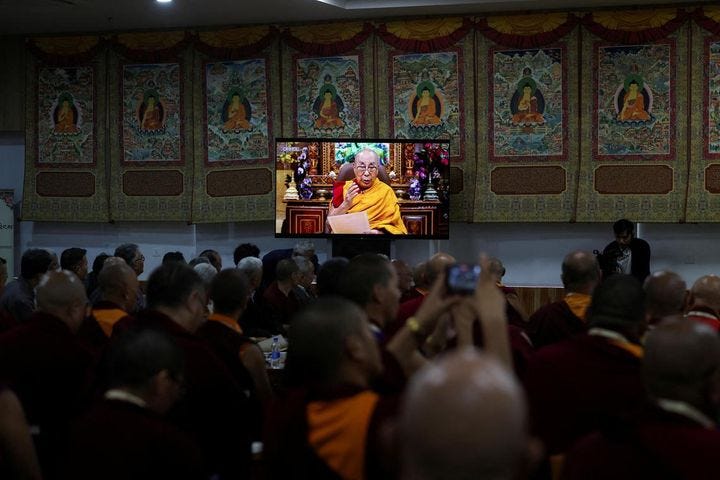China This Week: Youth Federations Elect Leaders, China Opposes Russia's Defeat, Foxconn Withdraws Chinese Staff from India
This week in China, we explore key developments in its domestic and foreign policy landscape.
China Quote 🗩
“A major takeaway is that there are deep disagreements that are likely to be persistent between the US and China, and these include issues around Taiwan, the South China Sea, the trade relationship, technology competition and human rights.”
- Neysun Mahboubi, is a US expert on Chinese law and director of the Penn Project on the Future of US-China Relations at the University of Pennsylvania.
Economic Activity🏦
Xi Chairs Economic Affairs Commission Meeting Focused on Market Unification and Marine Economy
Sinocism reports that Chinese President Xi Jinping chaired the 6th meeting of the Central Commission for Financial and Economic Affairs, highlighting plans to build a unified national market and develop the marine economy. The "five unifications and one openness" framework was emphasised, underscoring tighter market integration and governance standardisation to boost high-quality growth.
China Issues Update After Trump Reveals Trade Deal
Newsweek reports that China has confirmed a trade agreement with the US, under which it will accelerate rare earth exports, while Washington will ease some export restrictions on Beijing. The deal, announced by President Trump, aims to stabilise supply crucial for US tech and defence industries. However, key disputes over tariffs, intellectual property, and tech controls remain unresolved, signalling ongoing challenges in bilateral relations.
Apple’s China iPhone sales grow for the first time in two years
CNBC reports that Apple’s iPhone sales in China rose 8% year-on-year in the quarter ending June, marking the first growth since mid-2023. The rebound was driven by discounts during the 618 shopping festival and increased trade-in offers. Despite this boost, Apple faces fierce competition from Huawei, which saw a 12% sales increase and now leads China’s smartphone market.
China Imposes Anti-Dumping Duties on EU Brandy as Ties Sour
Bloomberg reports that China imposed anti-dumping duties on European brandy for five years, as diplomatic and trade tensions escalate between the two trading partners. The decision, following a months long probe, came after authorities concluded that dumping of brandy by the European Union caused actual damage to the domestic industry, according to a statement from the Ministry of Commerce.
Inside China🐉
China’s giant new gamble with digital IDs
The Economist reports that China will launch nationwide digital IDs on 15 July, shifting online identity verification from private companies to the state. Citizens must submit extensive personal data, including facial scans, to obtain these IDs, which could soon become mandatory. While billed as a privacy measure to curb fraud, the scheme enhances state surveillance, consolidates control over data, and may bolster China’s AI ambitions by enabling more centralised, high-quality data flows.
China's youth and students' federations elect new leadership

CGTN reports that the All-China Youth Federation and the All-China Students' Federation concluded meetings in Beijing on Thursday, setting out their five-year plans and electing new leaders. Xu Xiao was chosen as chair of the Youth Federation, while Peking University's student union will lead the Students' Federation. The gatherings urged youth to strengthen ideals and contribute to Chinese modernisation.
‘A billion people backing you’: China transfixed as Musk turns against Trump
Amy Hawkins writes in The Guardian that Elon Musk’s public break with Donald Trump has captivated Chinese social media, with many users cheering Musk’s pledge to form a new “America party” after opposing Trump’s tax bill. Widely admired in China for his technological vision, Musk is seen as injecting fresh energy into politics, while Trump remains viewed as unpredictable and combative, fuelling fascination with their dramatic fallout.
China and the World🌏
To compete, Asia must learn from how China breeds apex predators
Yeh-Pow Mak writes for South China Morning Post that Asia must sharpen its competitive edge by emulating China’s strategy of “breeding apex predators”—dominant firms born from fierce domestic competition and bolstered by state policies. Chinese companies endure intense market pressure and selective support—preferential tax breaks and finance—to emerge globally formidable. Rather than erecting trade barriers, Asia-Pacific policymakers and executives should seize opportunity from China-driven supply chains and foster regional AI and tech investments. By investing in innovation, nurturing homegrown talent, and strategically supporting high-potential firms, Asian economies can spawn their own global champions.
China tells EU it does not want Russia to lose Ukraine war: sources
South China Morning Post reports that Chinese Foreign Minister Wang Yi told EU foreign policy chief Kaja Kallas that Beijing does not want to see Russia defeated in Ukraine, fearing it would allow the US to focus entirely on China. Wang denied materially aiding Moscow but threatened retaliation over EU plans to sanction Chinese banks, revealing deep tensions ahead of the July summit.
‘Quad’ nations announce critical minerals initiative amid China concerns

The Japan Times reports that Australia, India, Japan and the US have launched the Quad Critical Minerals Initiative to reduce reliance on China’s dominant position in rare earths and critical minerals. The alliance aims to secure and diversify supply chains, enhance e-waste recovery, and strengthen economic security. While careful not to name China directly, the statement reflects rising worries over Beijing’s leverage in mineral processing and geopolitical coercion.
Taiwanese President Lai Chooses to Confront China
Yian Lee writes in Bloomberg that Taiwan’s President Lai Ching-te has intensified his confrontational stance against Beijing, blacklisting Chinese tech giants Huawei and SMIC to curb chip exports and tightening economic ties with the US. On a national tour, Lai is urging citizens to unite against Chinese pressure, declaring Taiwan an independent country and revealing closer military exchanges with Washington, risking further escalations with China.
China sanctions former Filipino lawmaker who defended Philippines’ South China Sea claims

AP News reports that China has sanctioned Francis Tolentino, a former Philippine Senate majority leader, for his “anti-China” stance, including drafting laws asserting Manila’s maritime claims in the South China Sea. Tolentino called the sanction a “badge of honour” and vowed to continue defending Philippine sovereignty. The Philippines criticised the move, warning it hampers efforts to rebuild trust and improve bilateral ties.
Two Chinese nationals charged for trying to recruit spies in US military
Al Jazeera reports that US authorities have charged Chinese nationals Yuance Chen and Liren “Ryan” Lai with acting as unregistered agents for China’s Ministry of State Security. The pair allegedly sought to infiltrate the US Navy by recruiting insiders and gathering sensitive intelligence, including personal data and ship details. The Justice Department described the case as part of China’s broader efforts to extend naval reach and undermine US security.
Ottawa orders Chinese tech firm to close Canadian operations over national security
Global News reports that Canada has ordered Hikvision, a Chinese surveillance equipment giant, to shut its Canadian operations after a national security review. Industry Minister Mélanie Joly said Hikvision’s continued presence threatened national security, echoing moves by the US, UK, and Australia. Hikvision criticised the decision, calling it biased and lacking factual basis.
Dalai Lama says he will have successor after his death

The Straits Times reports that the Dalai Lama has confirmed his 600-year-old spiritual institution will continue after his death, asserting that the responsibility for selecting his reincarnation rests solely with his India-based trust. His announcement, ahead of his 90th birthday, directly challenges Beijing’s claim that only China can approve his successor. The move reinforces Tibetan cultural identity and autonomy.
Iran Strike Was a Triumph That Showed American Weakness
Hal Brands writes in Bloomberg that while the US strike on Iran's nuclear programme showcased unmatched global power projection, it also underscored how overstretched American military capabilities have become. Brands argues that debates over pivoting to China versus global commitments reveal a defence strategy strained by competing priorities, leaving America vulnerable despite its technological superiority.
Tech in China🖥️
Foxconn Pulls Chinese Staff From India in Hurdle for Apple
Sankalp Phartiyal, Debby Wu, and Mark Gurman write in Bloomberg that Foxconn has recalled hundreds of Chinese engineers and technicians from its iPhone factories in southern India, undermining Apple’s efforts to diversify manufacturing beyond China. Over 300 Chinese workers have left in recent weeks, leaving mainly Taiwanese support staff, highlighting ongoing challenges in India’s localising push for high-end electronics assembly.
Meta’s AI lab stacked with Chinese talent, drawing attention back home
South China Morning Post reports that seven of 11 publicly listed hires at Meta’s new Superintelligence Labs graduated from top Chinese universities before moving to the US. This influx has triggered admiration in China and renewed debates on global AI talent flows. Meta’s aggressive recruitment, including massive signing bonuses, has also fuelled tensions with rivals like OpenAI.
Decypher Data Dive📊
China makes more than 70% of the world’s electric cars in 2024, staying the top country for Electric Vehicle (EV) production. EV market share has surged with Chinese brands playing a major role in many markets.

Image of the Week📸

— — —
Data By Bhupesh
Edited By Aurko
Produced by Decypher Team in New Delhi, India

